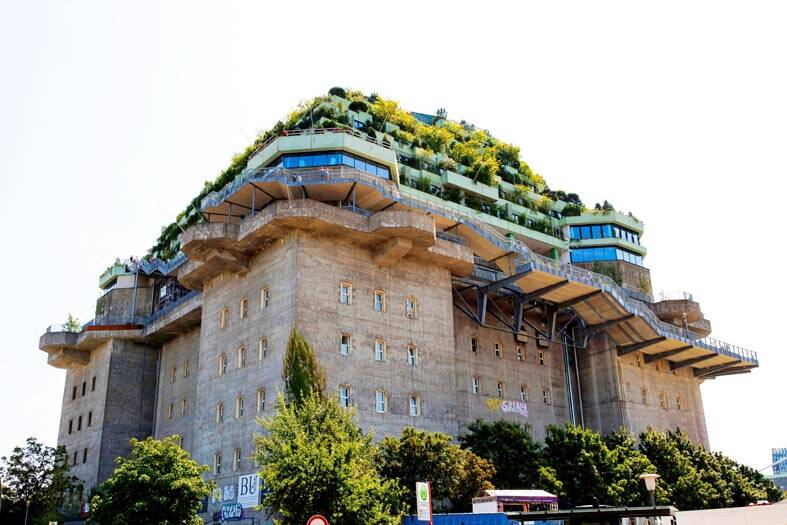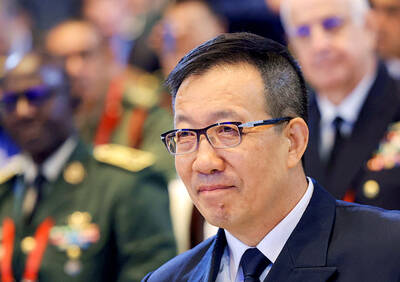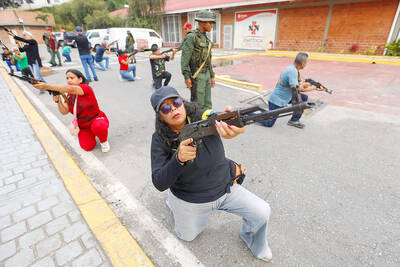A huge former Nazi bunker in Hamburg, Germany, has been transformed into a leisure complex filled with restaurants, a concert hall and roof terraces where visitors can relax in an orchard.
It is a novel answer to the question that has long vexed Germany — what to do with former Nazi sites that are too complex to demolish?
The five-story concrete structure in Hamburg’s St Pauli district, one of the largest bunkers in the world, can now be accessed via steps bolted onto the outside of the building.

Photo: AFP
The complex includes a hotel with 134 bedrooms, a 2,000-seat concert space and allotment plots for locals.
“The idea of raising the height of the building with greenery was to add something peaceful and positive to this massive block left over from the Nazi dictatorship,” said Anita Engels from the Hilldegarden neighborhood association, which supported the project.
Almost 40m tall and weighing 76,000 tonnes, the St Pauli bunker has exterior walls 2.5m thick and a roof consisting of 3.5m of reinforced concrete.
The building was one of eight “flak towers” constructed by Adolf Hitler during the Third Reich, with anti-aircraft guns standing where the apple trees now grow.
Three were in Berlin, two in Hamburg and three in Vienna.
“They protected the government quarter in Berlin, the port facilities in Hamburg and the historic center that Hitler loved in Vienna,” historian Michael Foedrowitz said.
The huge structures also functioned as shelters, as well as serving as a kind of architectural “propaganda” about the power of Hitler’s rule, he said.
The flak tower at Berlin zoo is the only one that has been completely destroyed, since the explosives required would pose too big a risk for the heavily populated areas where the others stand.
After the war, the bunker in St Pauli was initially used as accommodation for homeless people before being transformed into office space for media and advertising companies in the 1950s.
The lower floors have more recently been home to a popular nightclub, a radio station and a climbing gym.
“But that didn’t lead to the story of the bunker being told, to critical reflection. There wasn’t even a sign at the entrance,” Engels said.
As part of the renovation project launched in 2019 by the city of Hamburg and private investors, Hilldegarden has been helping to bring the history of the building back to life.
The association has collected testimonies from people who lived in the bunker during and after the war as well as records of the hundreds of forced laborers who built the structure in just 300 days in 1942.
On the first floor, an exhibition now presents the history of the site.
“In Berlin, up to 60,000 civilians were counted taking refuge in a pair of towers designed to hold around 30,000 people — the size of a small town,” Foedrowitz said.
The St Pauli complex housed up to 25,000 civilians including during the Allied bombing raids of Operation Gomorrah in July 1943, which devastated Hamburg.
Brigitte Schulze, a 72-year-old pensioner who came to visit the refurbished bunker, said she felt it was “good to keep this history alive, especially as the witnesses are disappearing.”
“And the setting is pleasant, with the park and the trees,” she said.
Schulze lives near Hamburg, but it had never occurred to her before to visit the building, which she described as “just an ugly wart.”
She was one of thousands of visitors to the new complex in its first month.
A few years ago, Hamburg’s second flak tower was converted into a mini power station producing electricity from renewable sources.
In Berlin, the towers in Friedrichshain and Humboldthain have been buried beneath unassuming artificial hills in two city parks.

BEIJING FORUM: ‘So-called freedom of navigation advocated by certain countries outside the region challenges the norms of international relations,’ the minister said Chinese Minister of National Defense Dong Jun (董軍) yesterday denounced “hegemonic logic and acts of bullying” during remarks at a Beijing forum that were full of thinly veiled references to the US. Organizers said that about 1,800 representatives from 100 countries, including political, military and academic leaders, were in Beijing for the Xiangshan Forum. The three-day event comes as China presents itself as a mediator of fraught global issues including the wars in Ukraine and Gaza. Addressing attendees at the opening ceremony, Dong warned of “new threats and challenges” now facing world peace. “While the themes of the times — peace and development —

Venezuela on Saturday organized a day of military training for civilians in response to the US deployment in the Caribbean, and amid new threats from US President Donald Trump. About a month ago, Washington deployed warships to international waters off Venezuela’s coast, backed by F-35 jets sent to Puerto Rico in what it calls an anti-drug and anti-terrorism operation. Venezuelan Minister of Defense Vladimir Padrino Lopez has accused Washington of waging “undeclared war” in the Caribbean, after US strikes killed over a dozen alleged drug traffickers off his country’s coast. Caracas also accused the US of seeking regime change, and

BRIBERY ALLEGATIONS: A prosecutor said they considered the risk of Hak-ja Han tampering with evidence to be very high, which led them to seek the warrant South Korean prosecutors yesterday requested an arrest warrant for the leader of the Unification Church, Hak-ja Han, on allegations of bribery linked to the country’s former first lady and incitement to destroy evidence. The move came a day after the 82-year-old was questioned over her alleged role in bribing former first lady Kim Keon-hee and a lawmaker. Founded in 1954 by her late husband, Sun Myung Moon, the Unification Church has long been the subject of controversy and criticism, with its teachings centered on Moon’s role as the “second coming” and its mass weddings. Followers are derisively referred to as “Moonies.” However, the church’s

‘MURDER’: The US has not provided proof that boats it has struck were trafficking drugs, and a Venezuelan official said it was a crime against humanity that must be investigated Venezuela on Friday accused the US of waging an “undeclared war” in the Caribbean and called for a UN probe of US strikes that have killed more than a dozen alleged drug traffickers on boats over the past few weeks. Washington has deployed warships to international waters off Venezuela’s coast, backed by F-35s sent to Puerto Rico in what it calls an anti-drug operation. “It is an undeclared war, and you can already see how people, whether or not they are drug traffickers, have been executed in the Caribbean Sea. Executed without the right to a defense,” Venezuelan Minister of Defense Vladimir